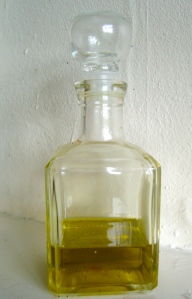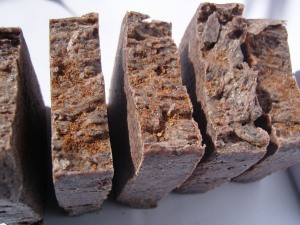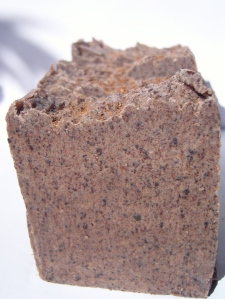Oil is fat, and fat has a very bad connotation these days! Just like sugar (another ‘bad’ word), fats are essential to the body’s main functions. Without fats and sugar, the brain cannot be ‘fed’ and symptoms like seizures or unconsciousness may occur.
Of course I’m not saying you should indulge in fried hamburgers and cup cakes! Sugar and fats come in many different forms, and one should know the difference. Your body, including your skin, will appreciate if you do!
The skin is the largest organ of our body, and it secrets oil (‘sebum’) to prevent dehydration and dryness. This is part of the body’s natural functioning. When this function becomes unbalanced, the skin can become dry or oily. ‘Ageing’ could be seen as a sort of skin imbalance, as sebum production is reduced, causing the skin to become dry and wrinkly.
So, if the skin produces its own protective oil, it makes sense that vegetable oils can contribute enormously to skin enhancement. By mimicking natural sebum, the skin’s look and texture can be improved drastically.
Vegetable oils are usually extracted from fruit kernels (apricot, peach), nuts (almond, hazelnut, walnut, etc), seeds (sesame, kiwi), and sometimes, flesh (avocado). Oils can be thin or thick; easily or slowly absorbed; sticky, leaving a protective film on the skin.
Coconut, palm, cocoa or shea ‘butter’ are ‘solid oils’ at room temperature. Although butters have their own beneficial properties, they’re not discussed here because they’re highly comedogenic, i.e., they promote the formation of ‘blackheads’ – so I consider them inappropriate for any facial product.
Be careful about food allergies – if you’re allergic to nuts, you’ll react to products that contain nut oils in their formula. Remember to always check the label.
Here is a list of what kind of vegetable oils to look for in your skin care and cosmetic products.
Oily skin
It may sound odd to treat oil with ‘more’ oil, but the less you strip your skin off its natural oil, the less oil it will produce. By choosing the right oils, the oily skin can be brought back into normal balance.
Jojoba – it’s probably the main oil used to treat oily skin. Jojoba oil is, in fact, a liquid wax and it’s very similar to skin’s natural sebum. It is easily absorbed by the skin, and leaves it with a velvety feel. It helps with breaking down grime in clogged pores, and it’s great if used as a make-up remover. Specially good in hair packs.
Hazelnut – it’s considered a ‘dry’ oil which is also astringent (constricting, good for enlarged pores), and rich in vitamin E, which acts as an antioxidant to the skin, a bonus benefit.
Other oils used to treat oily skin include hemp, kiwi, and strawberry – latter considered to be a very luxurious one!
Sensitive and other skin problems
Oils that are good for sensitive skin and other skin conditions are oils which counteract skin inflammation and irritation.
Again, what works in a healthy diet works for a healthy skin too! The best vegetable oils with anti‑inflammatory properties are the ones packed with essential fatty acids. The problem with these oil is that they ‘go off’ really quickly, so products that contain these oils should be as ‘fresh’ as possible, as they will have a short shelf-life.
Evening primrose – well known for its ‘hormonal balancing’ properties, it’s easy to find it in capsules which you can use to ‘pimp’ up your usual night moisturiser, for example.
Wheat germ – rich in vitamin E, it soothes skin that is cracked and dry, so it’s a good choice when added to products to treat ‘dry’ eczema, psoriasis and dermatitis.
Dry x dehydrated skin
Most people think that dry and dehydrated skin means exactly the same. In fact, it’s much easier to deal with dehydrated skin – which is lacking water. Few fine lines may appear, for example, the morning after an alcohol-fuelled night! As soon as the body and skin are replenished with enough water, you should see these lines go – it’s a reversible, momentarily painful sight!
Dry skin is lacking oils, and it is much harder to feed the body with enough healthy oils. Diet will certainly play a major role here, and including oily fish in your meals should help.
Avocado – very thick but quickly absorbed, it’s especially good in night creams. It leaves a protective film on the skin, so it works its magic on those windy, dry and cold days too.
Macadamia – rich, thick, ‘sticky’ and slowly absorbed, its high content of palmitoleic acid, which occurs in natural sebum, makes it the oil of choice for dry and ageing skin.
Olive – thick and a bit sticky, like avocado oil, it forms a protective film on the skin, and it’s highly moisturising, soothing and nourishing. It works well for sensitive and problem skin too.
Scar tissue or mature skin
Mature skin has similar characteristics to dry skin, so oils that help with dry conditions (check above) will also benefit mature skin.
Rosehip – produced in Chile, this makes a luxurious addition to your skin care regime for its unique regenerative properties. It contains high levels of retin A, linolenic (omega-3) and linoleic (omega-6) acids, so it benefits sensitive, inflamed and irritated skin too!
Normal
Although very few people are lucky enough to have a perfect complexion, they still need to take good care of their skin to maintain its healthy lustre!
Almond, apricot or peach – with very similar characteristics, they’re all light, easily absorbed, nourishing and moisturising. These form the ‘bread and butter’ of anyone’s skin care regime, as they’re all good for any skin type.



